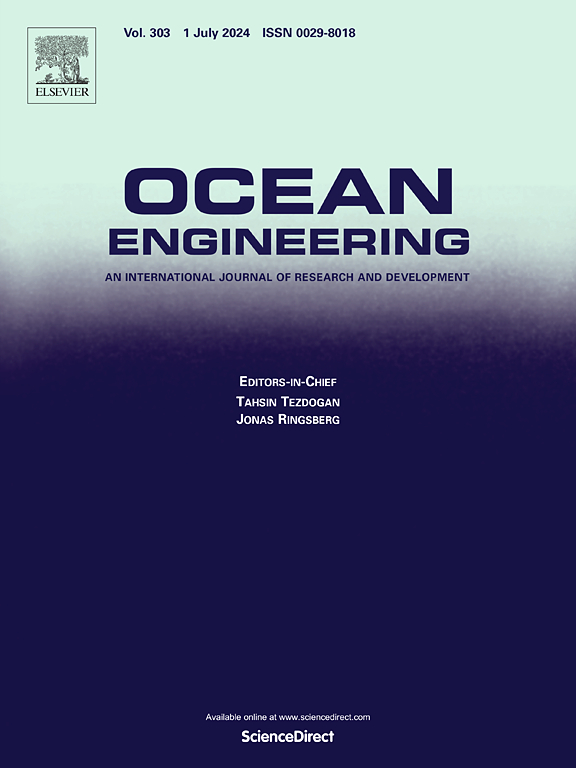全耦合 USV 型波浪能转换器的参数分析:基于波浪到电网建模的方法
IF 4.6
2区 工程技术
Q1 ENGINEERING, CIVIL
引用次数: 0
摘要
波浪能转换器与具有发电能力和移动能力的无人水面航行器(USV)的集成,在概念设计、控制和参数研究方面正引起越来越多的关注,因为该集成系统可在商业、科学和军事等海洋领域发挥关键作用。提高 USV 集成波浪能转换器的发电量有助于延长 USV 的运行时间或电网供应,但这种新型设备的发电性能受其各种耦合子系统的影响很大,因此需要一种系统的方法来区分关键设计参数。为解决这一问题,我们开发了一个反映所有子系统耦合、能量损失和约束条件的综合波浪并网模型,以全面描述系统动力学,然后采用田口方法研究选定设计参数对发电量的影响。结果表明,液压缸活塞面积和蓄能器压力是影响拟议 USV 型波浪能转换器时均电功率的两个最大参数。所提出的方法为技术人员如何优化设计波浪能转换器提供了指导。本文章由计算机程序翻译,如有差异,请以英文原文为准。
Parametric analysis of a fully coupled USV-type wave energy converter: An approach based on wave-to-grid modelling
The integration of the wave energy converter and the unmanned surface vehicle (USV), which has the power generation capability and the mobile capability, is attracting increasing attention in concept design, control, and parametric study, as the integrated system can play a crucial role in the maritime sectors of commerce, science, and military. Enhancing the power generation of a USV-integrated wave energy converter contributes to prolonged USV operations or grid supply, but the power generation performance of this new-type device is significantly influenced by its various coupled subsystems, which requires a systematic methodology for distinguishing key design parameters. To address that problem, a comprehensive wave-to-grid model that reflects all subsystem coupling, energy losses, and constraints is developed to comprehensively describe system dynamics, and then a Taguchi method is employed to investigate the influence of selected design parameters on electric power generation. Results reveal that the piston area of the hydraulic cylinder and the accumulator pressure are the two most influential parameters affecting the time-averaged electric power of the proposed USV-type wave energy converter. The proposed methodology provides guidelines for technicians on how to design wave energy converters optimally.
求助全文
通过发布文献求助,成功后即可免费获取论文全文。
去求助
来源期刊

Ocean Engineering
工程技术-工程:大洋
CiteScore
7.30
自引率
34.00%
发文量
2379
审稿时长
8.1 months
期刊介绍:
Ocean Engineering provides a medium for the publication of original research and development work in the field of ocean engineering. Ocean Engineering seeks papers in the following topics.
 求助内容:
求助内容: 应助结果提醒方式:
应助结果提醒方式:


